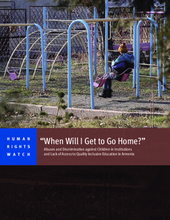Report Summary
Most children in Armenia in orphanages and other residential institutions end up in them because they have disabilities or due to poverty and other vulnerabilities that make it difficult for their families to care for their children. Indeed, 90 percent of children in residential care in Armenia have at least one living parent. While governments have obligations to provide for alternative care where a child is deprived of their own family environment, long-term institutional care is not a suitable alternative to family-based care for any child, whether with or without disabilities. Even the most well-resourced institutions cannot replace a family, and research by the United Nations Children’s Fund (UNICEF) and others has demonstrated that life in institutions can have serious consequences for children’s physical, cognitive, and emotional development.
The government of Armenia is undertaking some important reforms aimed at protecting the rights of children. These include reducing the number of children in state-run residential institutions and moving these children back to their families, with community-based services and other means to support families, a process known as deinstitutionalization. An essential component of deinstitutionalization is reform to the education system to expand opportunities for all children, including children with disabilities, to study in their communities.
However, Human Rights Watch is concerned that these reforms will fall short of reaching their potential to ensure the basic rights of all children in Armenia to live in the community and to enjoy a quality education. Human Rights Watch is particularly concerned that children with disabilities will be left behind and face further discrimination. Human Rights Watch research in 2016 indicates that the Armenian government needs to make much more effort to prioritize development of community-based alternatives to residential institutions, or risk a continued reliance on institutions, rather than ensuring that children, particularly children with disabilities, grow up in a family, as is their right.
Although reforms over several years have helped to ensure that more children with disabilities study in community schools, many children with disabilities do not receive a quality education in these schools, due to a lack of reasonable accommodations to facilitate their learning. Education is a prerequisite for full inclusion and participation of people with disabilities in the community, and for countering isolation and exclusion.
The government’s policies on deinstitutionalization and inclusive education, as they are currently being implemented, do not guarantee the rights of children with disabilities on an equal basis with other children and are discriminatory. As the starkest example, the government plans to transform three orphanages, known as generalized orphanages, which primarily house children without disabilities, into non-residential centers to provide community-based services. However, the authorities have no plans to transform or close three other orphanages where children with disabilities live. Thus by 2020, when the three generalized orphanages are slated to be transformed from residential institutions to community-based service providers, only children with disabilities will remain in orphanages. Most are at risk of needlessly spending their entire lives in an institution.
The government of Armenia and its partners in the deinstitutionalization process should immediately take steps to prioritize family-based care equally for all children currently in residential institutions and at risk of being placed in residential institutions. The government should also ensure provision of a quality education equally to all children, without discrimination.
This report is based on Human Rights Watch visits to five state-run orphanages and ten state-run schools, including six special schools and four mainstream schools, and interviews with 173 people, in eight cities in Armenia. We interviewed 47 children and young adults, and 63 families of children living in orphanages, attending special schools or attending mainstream schools. We also interviewed directors of orphanages, special schools, and mainstream schools, as well as social workers, doctors, teachers, psychologists, caregivers, and other staff in institutions.
To learn more about this report, watch a video on institutional care in Armenia, or download the "easy to read" report, please visit HRW's website by clicking here. To download the full report, please click the image above.

